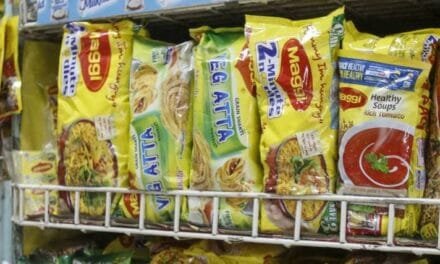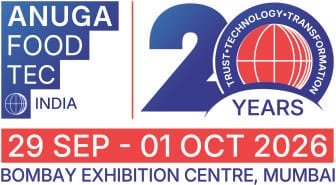Spurious and duplicate food products are not only the risk to human health but are a big challenge for companies and our food regulatory system also. Only a concerted effort and vigilance both by consuming public as well as the company’s dealer distribution network can bring some degree of control in this trade although complete control seems to be a far cry writes Rajat K. Baisya.
I was in Kumbh Mela in Prayagraj last month. Two things that had drawn my attention were the cleanliness and the sale of spurious food products by food vendors. I had visited Kumbh Mela earlier also but never before I have seen it so clean and well organised like this time. But in that effort food companies have also come forward and contributed. Red Label Tea from HUL has installed tea and coffee vending machines at various locations of Kumbh Mela where anyone can get tea or coffee free if he or she brings waste to dispose off.
Individuals and groups are encouraged to bring in the waste they generate and deposit and get a cup of tea or coffee free instead of throwing or dumping that waste in the open or roadside. This is a very noble effort from a corporate house which can send the right message across and help educate the people on the importance of waste disposal. I have seen people are depositing the waste in bags and drinking tea and coffee free. I took a picture of the vending machine for PFI (see box). More such efforts are required to make our country clean and pollution-free.
The second thing that had drawn my attention is the rampant sale of spurious and duplicate food products in Kumbh Mela ground. Most of those are popular brands from well-known food companies including MNCs. I have personally examined a few such packs of popular brands such as biscuit brands from Britannia, Parles and ITC. There is no Food Safety and Authority of India (FSSAI) logo or license number printed on the label and products are selling much cheaper than the regular price of these products. This is a big challenge for our food regulatory system.
Organising training camp and conference in Delhi and other state capital cities can have a very limited impact on the spurious and duplicate food producers flooding the rural market in India taking advantage of the limitation of the distribution reach in this vast country. But that is what Food Safety and Authority of India is doing, organising training in Delhi and talking about it. The machinery and resources that FSSAI has are grossly inadequate to control and manage this widespread menace. And this needs serious consideration.
FSSAI send out circulars and formulates new standards, specification and guidelines for food manufacturers and marketers every week but in terms of enforcing those, they are miserably failing. When Food Safety and Authority of India cannot control the manufacture and sale of spurious and duplicate food products, how they can control street food vendors whose numbers are in millions. An estimate puts the number of street food vendors at 30 million. Once FSSAI declared that every food vendor or stockist will have to take a license as Food Business Operator (FBO) from FSSAI. Soon they realised that it is a herculean task not easy to accomplish. They don’t talk about that now any longer.
It is well known to food marketers that spurious and duplicate food products are being sold in the market and some companies even are known to have either warned public by releasing advertisements about duplicate food products so that public should inform the company in case they happen to find such duplicate food products being sold. But there is a very limited result from those public awareness campaigns. The parallel spurious food trade is going on unabated for a long time.
There are various estimates that are being talked about regarding the degree and magnitude of such spurious food products that are traded in the market. It can be anything from 15 to 20 % of the total packaged food products. The rough estimate of processed food products in India is about INR 30000 crores. That would translate the spurious food products market at INR 4500 crores which are not a small volume of business by any standard. The popular brands are duplicated more as these are easy to sell in the trade because the products have a pull in the market and the products are in short supply.
The spurious food products should not be confused with the adulterated products that are sold in the market which is another big problem in food trade in India. Spices and milk, for example, are adulterated which itself is a big problem. Fresh fruits, vegetables, fish and similar products are coloured to make them attractive and that happens even in Delhi. This is in addition to the spurious food trade that is going on over a long period of time. And it is everybody’s knowledge.
Food inspectors are mostly working in large cities and they very rarely visit the market of smaller cities and rural market where both adulterated foods as well as spurious and duplicate food products are posing serious problems of public health. Corporations are also known to have organised occasional raids in those unlicensed manufacturing and production centres but as these are only makeshift production centres and they resurface soon thereafter.
It, therefore, naturally raises the question that what can be done about that, which can have some lasting impact. FSSAI takes an application for licensing online and these operators don’t even know how to make applications online as they are not tech-savvy and they don’t have any facilities to do so. As a result, there is a huge stock of products that are sold in the market which don’t have any license. Their labels don’t carry FSSAI license numbers, they don’t have any bar code and therefore, they are not traceable regarding from where they produce and sell. Their trade is in all cash and there are no records of their operations. Products are normally given on credit to the retail outlets and payment is collected once goods are sold. As such it is a parallel food trade. And they pose a very big challenge.
On one hand, the company loses that much of sales and profit and on the other, the company also has a risk of losing reputation for the consumption of the product which doesn’t conform to their quality standard. It is the task of the food regulatory authority to control this menace but it appears as impossible as FSSAI don’t have the necessary resources. Only a concerted effort and vigilance both by consuming public as well as the company’s dealer distribution network can bring some degree of control in this spurious trade although complete control seems to be a far cry. Training and education of consumers on a massive scale is what is needed which alone can reduce this widespread problem to some extent.
The author is the chairman of Strategic Consulting Group and served as Professor and Head of the Department of Management Studies, IIT Delhi.
















